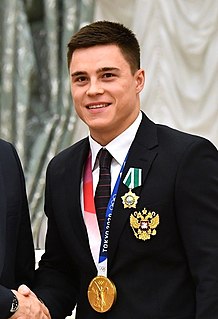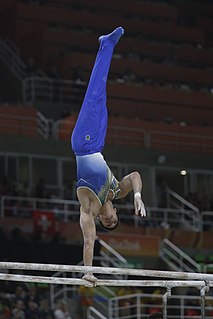
Nikita Vladimirovich Nagornyy is a Russian artistic gymnast and two-time Olympian, representing Russia in 2016 and ROC in 2020. He was part of the teams who won gold at the 2020 Olympic Games and 2019 World Championships and silver at the 2016 Olympic Games and 2018 World Championships.

The men's artistic individual all-around competition at the 2016 Summer Olympics was held on 6 and 10 August 2016 at the HSBC Arena. Kōhei Uchimura won gold, becoming the first male gymnast in 44 years to do this in two successive Olympic Games. Uchimura also became the second man to earn three all-around medals, matching countryman Sawao Kato with two golds and one silver. Uchimura's victory was Japan's sixth in the men's all-around, tying the Soviet Union for most all-time. His margin of victory was only 0.099, which was less than one small step on landing in terms of gymnastic scoring. It was also his eighth consecutive victory at the top competition of the year. Oleg Vernyayev's silver was Ukraine's first medal in the event since 2000. Max Whitlock's bronze was Great Britain's first since the 1908 Games in London.

The men's vault competition at the 2016 Summer Olympics in Rio de Janeiro was held at the HSBC Arena on 15 August 2016. There were 17 competitors from 14 nations. The event was won by Ri Se-gwang of North Korea, the nation's first medal in the men's vault. Denis Ablyazin repeated as silver medalist, the eighth man to win multiple medals in the event. Kenzō Shirai earned Japan's first medal in the men's vault since 1984 with his bronze.

The men's pommel horse competition at the 2016 Summer Olympics was held at the HSBC Arena on 6 and 14 August. There were 71 competitors from 36 nations. The event was won by Max Whitlock of Great Britain, the nation's first medal in the men's pommel horse. The nation finished 1–2 in the event, with Louis Smith repeating as silver medalist. It was the first time any nation had earned the top two spots in the event since the Soviet Union swept the medals in 1952. Smith was the second man to win three medals in the event, while Whitlock was the 11th to win two medals.

The men's rings competition at the 2016 Summer Olympics was held at the HSBC Arena on 6 and 15 August. There were 70 competitors from 34 nations. The event was won by Eleftherios Petrounias of Greece, the nation's first medal in the men's rings since 2004. Defending champion Arthur Zanetti of Brazil finished second, making him the 13th man to win multiple medals in the event. Denis Ablyazin earned Russia's first post-Soviet medal in the event with his bronze.

The men's parallel bars competition at the 2016 Summer Olympics was held at the HSBC Arena on 16 August. There were 67 competitors from 33 nations. The event was won by Oleg Verniaiev of Ukraine, the nation's first victory in the parallel bars since 2004 and third overall. Danell Leyva won the United States' first medal in the event since 1996 with his silver; David Belyavskiy's bronze was Russia's first medal in the parallel bars since 2000. China's four-Games podium streak in the event ended.

Miguel Rayderley Zapata Santana is a Spanish male artistic gymnast of Dominican Republic origin, and a member of the national team. He won the gold medal in the men's floor exercise at the 2015 European Games, and bronze at the 2015 World Artistic Gymnastics Championships in Glasgow. Zapata was also selected to compete for the Spanish squad at the 2016 Summer Olympics in Rio de Janeiro, missing out of the final by almost two tenths of a point from the qualifying phase of his signature apparatus exercise. Zapata won a silver medal for Spain in the men's floor exercise event of the artistic gymnastics competition at the 2020 Tokyo Summer Olympics.

Artem Olegovich Dolgopyat is an Israeli artistic gymnast. He is the 2020 Olympic champion on floor exercise. He also won two silver medals at the 2017 and 2019 World Championships on the floor exercise, and is the 2020 European champion of that exercise.

The men's artistic individual all-around event at the 2020 Summer Olympics was held on 24 and 28 July 2021 at the Ariake Gymnastics Centre. Approximately 70 gymnasts from 35 nations competed in the all-around in the qualifying round.
The women's artistic individual all-around event at the 2020 Summer Olympics in Tokyo was held at the Ariake Gymnastics Centre on 29 July 2021. Approximately 80 gymnasts from 49 nations competed in the all-around in the qualifying round.

The men's vault event at the 2020 Summer Olympics was held on 24 July and 2 August 2021 at the Ariake Gymnastics Centre. Unlike the other apparatus events, vault requires gymnasts to perform two exercises in order for results to count towards the vault final; most of the gymnasts perform only one or none. Approximately 20 gymnasts from 15 nations competed two vaults in the qualifying round.

The women's vault event at the 2020 Summer Olympics was held on 25 July and 1 August 2021 at the Ariake Gymnastics Centre. Unlike other the other apparatus events, vault requires gymnasts to perform two exercises in order for results to count towards the vault final; most of the gymnasts perform only one or none. Approximately 20 gymnasts from 15 nations competed two vaults in the qualifying round.

The women's floor event at the 2020 Summer Olympics was held on 25 July and 2 August 2021 at the Ariake Gymnastics Centre. Approximately 85 gymnasts from 53 nations competed on floor in the qualifying round.

The men's pommel horse event at the 2020 Summer Olympics was held on 24 July and 1 August 2021 at the Ariake Gymnastics Centre. Approximately 70 gymnasts from 35 nations competed on pommel horse in the qualifying round.
The men's rings event at the 2020 Summer Olympics was held on 24 July and 2 August 2021 at the Ariake Gymnastics Centre. Approximately 70 gymnasts from 35 nations competed on rings in the qualifying round.

The men's parallel bars event at the 2020 Summer Olympics was held on 24 July and 3 August 2021 at the Ariake Gymnastics Centre. Approximately 70 gymnasts from 35 nations competed on parallel bars in the qualifying round.

The men's horizontal bar event at the 2020 Summer Olympics was held on 24 July and 3 August 2021 at the Ariake Gymnastics Centre. Approximately 70 gymnasts from 35 nations competed on the horizontal bar in the qualifying round.

The women's uneven bars event at the 2020 Summer Olympics was held on 25 July and 1 August 2021 at the Ariake Gymnastics Centre. Approximately 90 gymnasts from 53 nations competed on the uneven bars in the qualifying round.

The women's balance beam event at the 2020 Summer Olympics was held on 25 July and 3 August 2021 at the Ariake Gymnastics Centre. Approximately 90 gymnasts from 53 nations are expected to compete on the balance beam in the qualifying round.
This article describes the qualifying results for 10 nominative spots earned through the FIG Artistic Gymnastics World Cup series for the 2020 Summer Olympics. It further describes the results for six non-nominative spots earned through the FIG Artistic Gymnastics World Cup All-Around series by nations who have qualified a for the team events at those Games.









